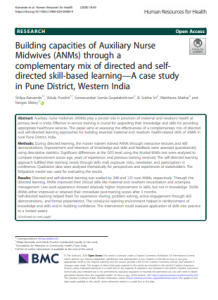
Abstract
Auxiliary nurse midwives (ANMs) play a pivotal role in provision of maternal and newborn health at primary level in India. Effective in-service training is crucial for upgrading their knowledge and skills for providing appropriate healthcare services. This paper aims at assessing the effectiveness of a complementary mix of directed and self-directed learning approaches for building essential maternal and newborn health-related skills of ANMs in rural Pune District, India.
Methods
During directed learning, the master trainers trained ANMs through interactive lectures and skill demonstrations. Improvement and retention of knowledge and skills and feedback were assessed quantitatively using descriptive statistics. Significant differences at the 0.05 level using the Kruskal-Wallis test were analysed to compare improvement across age, years of experience, and previous training received. The self-directed learning approach fulfilled their learning needs through skills mall, exposure visits, newsletter, and participation in conference. Qualitative data were analysed thematically for perspectives and experiences of stakeholders. The Kirkpatrick model was used for evaluating the results.
Results
Directed and self-directed learning was availed by 348 and 125 rural ANMs, respectively. Through the directed learning, ANMs improved their clinical skills like maternal and newborn resuscitation and eclampsia management. Less work experience showed relatively higher improvement in skills, but not in knowledge. 56.6% ANMs either improved or retained their immediate post-training scores after 3 months.
Self-directed learning helped them for experience sharing, problem-solving, active engagement through skill demonstrations, and formal presentations. The conducive learning environment helped in reinforcement of knowledge and skills and in building confidence. This intervention could evaluate application of skills into practice to a limited extent.